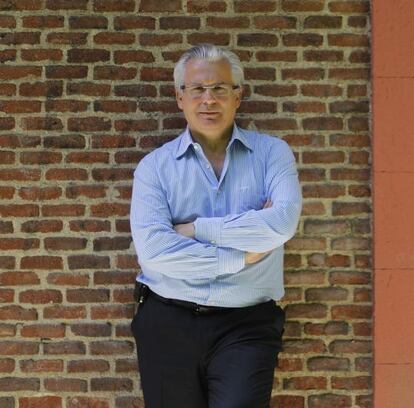"I decided to take Julian Assange's case because I believe in his cause"
Controversial judge still fearless despite cut in his security


Chuckling to himself, Baltasar Garzón explains that when people see him walking down the street alone, without any bodyguards, they come up and offer to "keep watch" over him until he reaches his destination.
Earlier this year, the Interior Ministry took away his bodyguards, as well as those assigned to dozens of other judges and public officials, as part of a money-saving measure. But Garzón says he is not afraid, given that he no longer receives threats in Spain. Now they come mostly from places where he now works - Mexico and Colombia - but in those countries he is afforded protection.
After 22 years at the High Court, Garzón was thrown off the bench after he was convicted by the Supreme Court in a controversial ruling for ordering jailhouse surveillance recordings of conversations between lawyers and defendants in the Gürtel kickbacks-for-public-contracts scheme. He was suspended for 11 years. "I am not an ex-judge, I am still a judge; I still have my title," Garzón insists, saying that he will keep on fighting until the decision is overturned.
I feel like I was the last person to have gone into exile because of Franco"
The judge - who sprang to international fame in 1998 when he issued an arrest warrant for former Chilean strongman Augusto Pinochet - has now taken on a case of similarly global proportions. He will be leading the defense team of Julian Assange, the WikiLeaks founder who is holed up in the Ecuadorean Embassy in London, fighting an extradition order to Sweden where he faces sexual assault charges against two women.
Question. Why did you decide to coordinate Julian Assange's defense team? What was it that impressed you about him?
Answer. He is totally different from the photos I have seen of him. He seems headstrong about his convictions, and in his defense of freedom of expression, the press and the free flow of information. I have seen that he isn't afraid of being put on trial, but he wants guarantees that his rights will be respected. I am working on his case pro bono because I believe in his innocence and his cause. To me it is clear that Sweden's extradition order is an excuse to take him to the United States to put him on trial for revealing information about US agencies. Assange won't be given a fair trial in the United States because it won't be a trial based on actual crimes but because of the political implications the exposures [of the US State Department cables] have caused.
Q. Will you also be participating in the defense of Bradley Manning? [The US Army soldier who originally leaked the classified material.]
A. I don't know Manning; I can't speak to him because he is under some type of "legal" hostage situation, where he is being physically and mentally abused. His lawyers plan on filing a lawsuit for torture.
Q. Was it a surprise for you to discover in those cables that the United States tried to stop the High Court investigation into Guantánamo, [the killing in Iraq of Spanish journalist] José Couso and the CIA's secret rendition flights, with the cooperation of Spanish politicians and prosecutors?
A. It was sad to discover that there are persons who work this way, instead of helping to find justice. Those who did this will one day have to explain why they did it. I was angry to see that a friendly and democratic country would interfere with such episodes in history.
Q. In the appeal you presented at the Constitutional Court, you say that your Supreme Court conviction had been drafted beforehand.
A. I believe my conviction was handed down from the start, when the complaints [from the Falange and Manos Limpias] were admitted.
Q. After your conviction, you left Spain. Do you feel that you went into exile?
A. I feel as if I were the last person to have gone into exile because of the Franco dictatorship.
Tu suscripción se está usando en otro dispositivo
¿Quieres añadir otro usuario a tu suscripción?
Si continúas leyendo en este dispositivo, no se podrá leer en el otro.
FlechaTu suscripción se está usando en otro dispositivo y solo puedes acceder a EL PAÍS desde un dispositivo a la vez.
Si quieres compartir tu cuenta, cambia tu suscripción a la modalidad Premium, así podrás añadir otro usuario. Cada uno accederá con su propia cuenta de email, lo que os permitirá personalizar vuestra experiencia en EL PAÍS.
¿Tienes una suscripción de empresa? Accede aquí para contratar más cuentas.
En el caso de no saber quién está usando tu cuenta, te recomendamos cambiar tu contraseña aquí.
Si decides continuar compartiendo tu cuenta, este mensaje se mostrará en tu dispositivo y en el de la otra persona que está usando tu cuenta de forma indefinida, afectando a tu experiencia de lectura. Puedes consultar aquí los términos y condiciones de la suscripción digital.








































